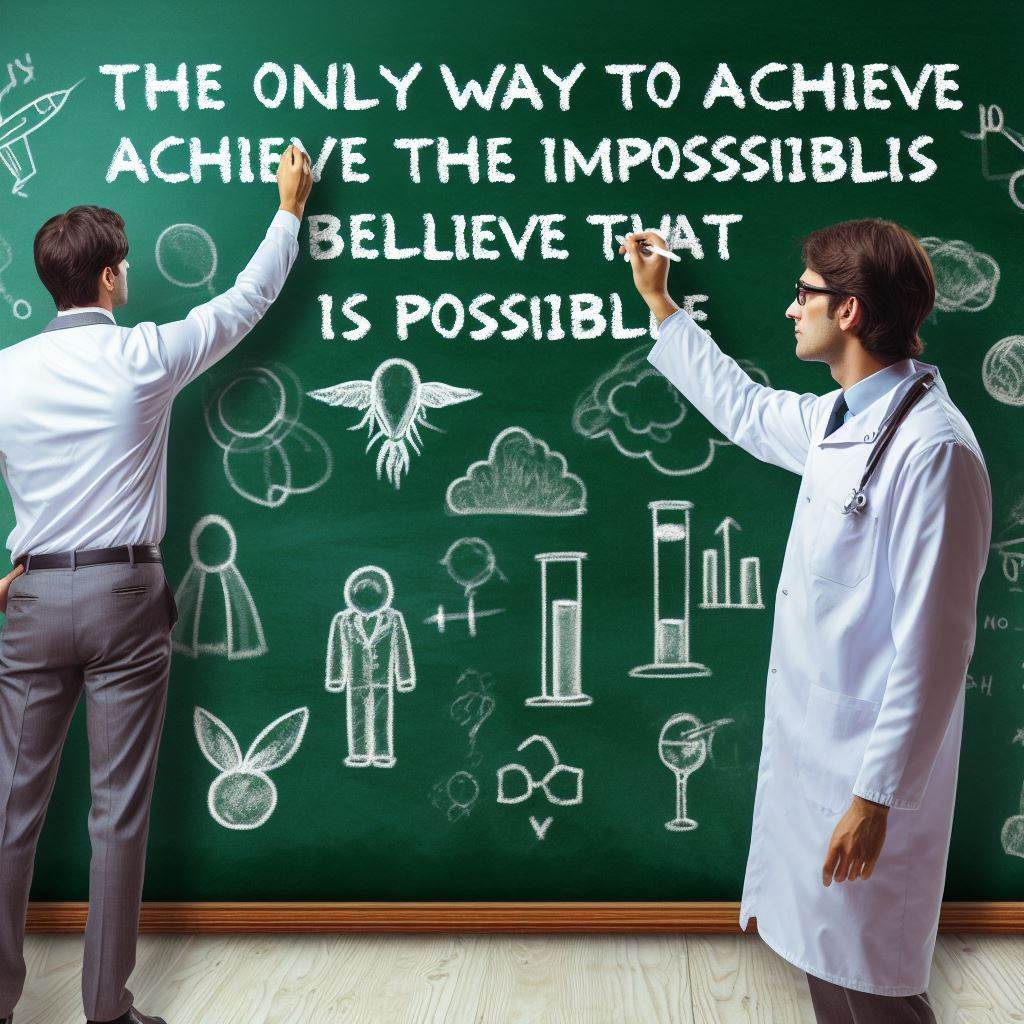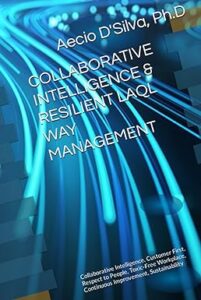Contents
- 1 Achieving the impossible is not a matter of luck or talent, but a matter of mindset and action. You can make your dreams come true by believing in new ideas, and by doing what you have never done before, what you never thought possible before, what many think impossible, and what goes beyond your current abilities and capabilities
- 2 Prof. Aécio D’Silva, Ph.D AquaUniversity
- 3 What Does It Mean to Achieve the Impossible
- 4
- 5 Why Believing in New Ideas Is Important
- 6 How to Believe in New Ideas
- 7
- 8 Why Going Beyond Your Limits Is Important
- 9 How to Go Beyond Your Limits
Achieving the impossible is not a matter of luck or talent, but a matter of mindset and action. You can make your dreams come true by believing in new ideas, and by doing what you have never done before, what you never thought possible before, what many think impossible, and what goes beyond your current abilities and capabilities
Prof. Aécio D’Silva, Ph.D
AquaUniversity
Achieve the Impossible – Have you ever had a dream that seemed impossible to achieve? A dream that was so big, so bold, so audacious, that you doubted yourself, or that others doubted you? A dream that challenged the status quo, the conventional wisdom, or the established rules? A dream that required you to learn new skills, overcome new obstacles, face new risks, or create new solutions? If you answered yes to any of these questions, then you are not alone. Many people have dreams that seem impossible to achieve, but some of them manage to turn their dreams into reality. How do they do it? How do they achieve the impossible? In this Collaborative Intelligence post, we will explore the power of believing in new ideas and going beyond your limits, and how you can use it to achieve your impossible dreams.
What Does It Mean to Achieve the Impossible
Achieving the impossible means to accomplish something that is considered extremely difficult, unlikely, or unrealistic, by yourself or by others. Achieving the impossible means defying the odds, breaking barriers, and surpassing expectations. Achieving the impossible means to make a difference, to make an impact, and to make a change.
Achieving the impossible is not a matter of luck or talent, but a matter of mindset and action. Achieving the impossible is not a result of what you have, but a result of what you do. Achieving the impossible is not a destination, but a journey. Achieving the impossible is not a one-time event, but a continuous process.
Achieving the impossible is possible, if you are willing to believe in new ideas, and to go beyond your limits.
Why Believing in New Ideas Is Important
Believing in new ideas is important because new ideas are the source of innovation, creativity, and progress. New ideas are the ones that challenge the existing paradigms, that offer new perspectives, and that open new possibilities. New ideas are the ones that inspire you, that motivate you, and that empower you.
Believing in new ideas is important because new ideas are the fuel of your dreams. New ideas are the ones that define your vision, that shape your goals, and that guide your actions. New ideas are the ones that drive you, that push you, and that pull you.
Believing in new ideas is important because new ideas are the key to achieving the impossible. New ideas are the ones that enable you to overcome the limitations, to solve the problems, and to create the solutions. New ideas are the ones that enable you to do what you have never done before, what you never thought possible before, what many think impossible, and what goes beyond your current abilities and capabilities.
Believing in new ideas is important because new ideas are the essence of your positive-creative attitude.
How to Believe in New Ideas
Believing in new ideas is not always easy, as you may face many challenges, such as:
- Doubt: Doubt is the feeling of uncertainty or lack of confidence in yourself or your ideas. Doubt can make you question your abilities, your potential, or your worthiness. Doubt can also make you fear failure, rejection, or criticism.
- Resistance: Resistance is the force that opposes or prevents you from accepting or adopting new ideas. Resistance can come from yourself, such as from your habits, beliefs, or comfort zone. Resistance can also come from others, such as from your family, friends, or society.
- Inertia: Inertia is the tendency to remain unchanged or to do nothing. Inertia can make you stick to the familiar, the comfortable, or the safe. Inertia can also make you avoid the unfamiliar, the uncomfortable, or the risky.
Believing in new ideas is not always easy, but it is possible, if you are willing to overcome these challenges, by using some strategies, such as:
- Trust: Trust is the belief in yourself and your ideas, and the confidence in your abilities, your potential, and your worthiness. Trust can help you overcome doubt, by affirming your strengths, your skills, and your value. Trust can also help you embrace failure, rejection, or criticism, as learning opportunities, feedback, or motivation.
- Openness: Openness is the willingness to accept or adopt new ideas, and to explore new perspectives and possibilities. Openness can help you overcome resistance, by challenging your habits, beliefs, or comfort zone. Openness can also help you appreciate the diversity, the richness, and the potential of yourself and others.
- Action: Action is the act of doing something, of taking steps, or of making progress. Action can help you overcome inertia, by breaking the status quo, the routine, or the boredom. Action can also help you create momentum, excitement, and results.
Believing in new ideas is possible, if you are willing to overcome the challenges, by using some strategies, such as trust, openness, and action. These strategies can help you develop and improve your positive thinking and creative thinking skills and enhance your positive-creative attitude.
Why Going Beyond Your Limits Is Important
Going beyond your limits is important because your limits are the boundaries that define your current state, your current performance, or your current reality. Your limits are the ones that tell you what you can or cannot do, what you consider possible or impossible, or what you are or are not. Your limits are the ones that constrain you, that restrict you, and that hold you back.
Going beyond your limits is important because going beyond your limits is the way to grow, improve, and achieve. Going beyond your limits is the way to expand your state, enhance your performance, and change your reality. Going beyond your limits is the way to unleash your potential, to discover your possibilities, and to create your opportunities.
Going beyond your limits is important because going beyond your limits is the way to achieve the impossible. Going beyond your limits is the way to do what you have never done before, what you never thought possible before, what many think is impossible, and what goes beyond your current abilities and capabilities.
Going beyond your limits is important because going beyond your limits is another essence of your positive-creative attitude.
How to Go Beyond Your Limits
Going beyond your limits is not always easy, as you may face many challenges, such as:
- Fear: Fear is the feeling of anxiety or apprehension caused by the anticipation or perception of danger, harm, or pain. Fear can make you avoid, escape, or freeze in the face of new or challenging situations.
- Comfort: Comfort is the feeling of ease or satisfaction derived from the absence of pain, difficulty, or stress. Comfort can make you settle, conform, or stagnate in the face of familiar or easy situations.
- Complacency: Complacency is the feeling of smug or uncritical satisfaction with oneself or one’s achievements. Complacency can make you stop, rest, or relax in the face of current or past situations.
Going beyond your limits is not always easy, but it is possible, if you are willing to overcome these challenges, by using some strategies, such as:
- Courage: Courage is the ability to face or overcome fear, and to act despite it. Courage can help you confront, face, or overcome new or challenging situations, by acknowledging your fear, but not letting it stop you. Courage can also help you take risks, make changes, or try new things, by accepting the possibility of failure, but not letting it define you.
- Discomfort: Discomfort is the feeling of unease or dissatisfaction caused by the presence of pain, difficulty, or stress. Discomfort can help you grow, improve, or achieve in the face of familiar or easy situations, by seeking pain, difficulty, or stress, as signals of learning, growth, or improvement. Discomfort can also help you stretch, challenge, or push yourself, by embracing pain, difficulty, or stress, as sources of motivation, inspiration, or innovation.
- Humility: Humility is the quality of having a modest or low view of one’s importance or achievements. Humility can help you continue, advance, or excel in the face of current or past situations, by acknowledging your limitations, weaknesses, or mistakes, but not letting them limit you. Humility can also help you learn, improve, or achieve, by seeking feedback, advice, or help, from yourself or others.
- Faith in God: Faith in God moves mountains. Faith that moves mountains believes that God is all-powerful and can accomplish what is humanly impossible. Faith in God shows you that does not matter what is happening, what other says, and the circumstances, God is always on your side. Through Faith in God, you can successfully accomplish your dreams that many thought were impossible. Despite the odds, you can manage to push boundaries and fulfill your dreams.
Going beyond your limits is possible, if you are willing to overcome the challenges, by using some strategies, such as courage, discomfort, humility, and faith in God. These strategies can help you develop and improve your positive thinking and creative thinking skills and enhance your positive-creative attitude.
Concluding, in this Collaborative Intelligence post, we have explored the power of believing in new ideas and going beyond your limits, and how you can use it to achieve your impossible dreams. We have shown that achieving the impossible is not a matter of luck or talent, but a matter of mindset and action. We have also shown that achieving the impossible is possible if you are willing to believe in new ideas, and to go beyond your limits.
Achieving the impossible is not a result of what you have, but a result of what you do. Achieving the impossible is not a destination, but a journey. Achieving the impossible is not a one-time event, but a continuous process.
I authored a book on Collaborative Intelligence and Total Excellence Leadership, designed to enhance your capabilities and push beyond your limits. This book serves as a valuable tool for training and empowering leaders and business professionals worldwide to effectively manage their enterprises. You can find it on Amazon Books!








Greetings Professor D’Silva, Oh how Truth, Way and Life are SPOKEN in this WISDOM SHARED…Greatly Appreciated and will SHARE THIS with others…Thank You Again for Sharing …God Bless You and La Familia Daily in the name of Jesus Christ…Amen